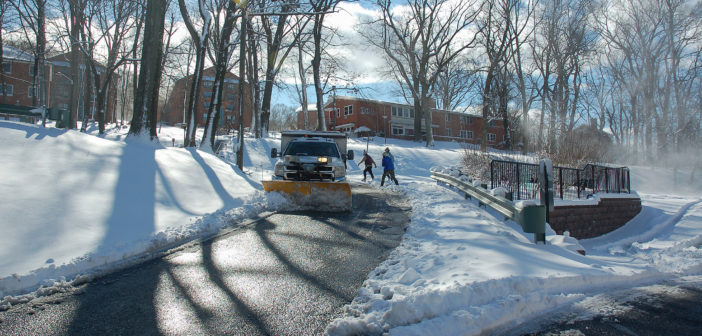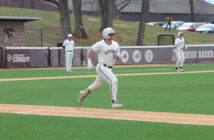At 5:39 p.m. Feb. 8, an LU-ALERT informed campus Lehigh would be closed until noon the next day.
To the students who read this message, it meant a snow day. But to the staff deemed essential — dining, transportation, facilities and residential services staffs — it meant work as usual.
Bruce Christine, the general manager of the dining management team, said he tries to keep dining services and hours as normal as possible despite snowstorms that might cause university closings or delays.
Christine said snowstorms are an inconvenience that require a lot of planning. But he said the more snowstorms there are and the more planning that goes into them, the more efficiently the dining team is able to operate.
Christine said the dining team obtains extra food and disposable food before possible closings or delays because it never knows how many inches of snow the storm will bring or how classes will be affected, if at all.
“It’s a lot of planning and late minute changing because no two storms have the same end result,” Christine said.
He said students expect to get what they pay for, so it’s up to the dining team to deliver and always provide some form of dining service. His priority is keeping his customers happy and offering nourishment.
In case workers aren’t able to drive to work, Christine said some live close enough to campus that they can walk. He said employees take advantage of the carpool system too, and if they’re unable to return home after work due to worsening weather conditions, Christine said he books them a hotel room near campus in the Comfort Suites.
Although the dining halls have emergency lighting, Christine said none have generators because they are a huge investment and would probably only be used a few times. However, he said there is talk of looking into generators in the future.
Bob Bruneio, transportation services manager, said transportation services are considered essential, so if the roads are safe and drivable, buses run despite snowstorms.
“If it’s not safe, we don’t run,” Bruneio said. “I don’t want to risk anybody’s safety.”
He said every snow or ice storm has different challenges, so the transportation staff tries to be proactive so it can execute the plan “smoothly and seamlessly.”
Bruneio said transportation services stays in close contact with facilities services, which stays in contact with the Provost’s Office. The provost makes the final call to close the university, keep it open or operate on a delay.
Bruneio said in addition to communicating with other university services, transportation services looks at routes, times, athletics and any extracurricular activities going on around campus in order to create a plan of action.
Bruneio said transportation services has upgraded its services and now offers a snow schedule on its website. He said in the event of a storm affecting the normal bus routes and schedules, students and staff are updated immediately.
“It’s not like we haven’t done this before, it’s not like it’s our first rodeo so to speak,” Bruneio said. “We have a very good team and a very good plan in place.”
Gary Falasca, the director of facilities services, said despite potential closings or delays, maintenance never sleeps. There is always a maintenance presence on campus.
Falasca said when the university operates on a delay or closing, essential maintenance personnel — including the staff member who is on-call, the next in-line to be on-call and their supervisor — are required to come in to work. Falasca said other employees can be called in as needed. In case some employees aren’t able to come to work, there are enough staff members who live in the Bethlehem area and can substitute.
Falasca said on the days that do not operate on a normal schedule, essential staff members continue with their normal assigned tasks but are available to address immediate maintenance needs. He said routine maintenance might be postponed during instances of short staffing.
Ozzie Breiner, the director of residential services, said some of the residential staff members are considered “essential,” including him, and are required to work despite snow closings or delays.
Breiner said these staff members take phone calls and resolve issues. He said there are always students who have needs that pertain to residential staff members, such as leaks in buildings due to snow buildup on roofs.
It’s not usually a problem for these essential staff members to get to work, Breiner said, but in the rare case they are unable to, they can work from home and notify residential staff members in residence buildings of their absence.






Comment policy
Comments posted to The Brown and White website are reviewed by a moderator before being approved. Incendiary speech or harassing language, including comments targeted at individuals, may be deemed unacceptable and not published. Spam and other soliciting will also be declined.
The Brown and White also reserves the right to not publish entirely anonymous comments.